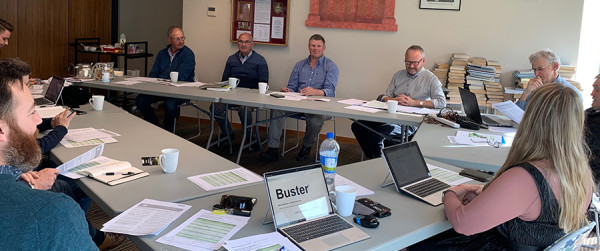Biosecurity Advisory Groups
Biosecurity Advisory Groups work with us to manage plant and animal pests across the region. They actively support us to deliver the objectives of our Regional pest management programme.

About the advisory groups
Biosecurity Advisory Groups provide advice and feedback on our pest management work which protects cultural, economic and biodiversity values in Canterbury. They also encourage community involvement in biosecurity activities.
- There are four groups: North, Central, South, and Christchurch/Banks Peninsula.
- Each group is made up of 7-10 community members, up to one member from each Papatipu Rūnanga with interests in the area, an Environment Canterbury councillor and up to two city or district council representatives.
- The groups meet in person three to four times per year, as well as for occasional shorter online sessions as required.
- In-person meetings are open to the public. Meeting venues move around each area throughout the term.
Members are supported to grow their knowledge and understanding of biosecurity priorities, actively contribute to discussions about regional and local biosecurity issues, and develop their networks and ability to be champions for biosecurity within their own communities.
What group members do
Support Regional Pest Management programme priorities
- Provide advice on the management of pests to protect a range of values, including primary production, biodiversity, and cultural values
- Contribute to biosecurity efforts to prevent new pests from arriving and becoming established.
Think regionally and act locally
- Work with Environment Canterbury to understand the challenges associated with managing pests that affect the region, and take action to support their local communities to respond to biosecurity threats
- Increase community understanding of how pests arrive and spread, how to mitigate biosecurity threats locally, and how the rest of the region is affected by local actions.
Act as biosecurity champions
- Champion actions to prevent the spread of pests within communities
- Advocate for implementation and meeting the requirements of the Canterbury Regional Pest Management Plan
- Help raise awareness of new and emerging biosecurity threats and promote community reporting of potential threats
Discuss pest management issues and initiatives
- Connect with local groups and organisations with an interest in biosecurity and pest management
- Encourage discussion of issues and sharing of information between local groups and organisations, to enable collaboration and shared approaches
Provide local intel
- Be vigilant to the arrival of new pests and advise Environment Canterbury of any new or emerging pest threats
- Liaise with local communities and relay back community concerns, feedback and suggestions
What the groups are not
- The groups have an informal consultative and advisory role. They are not committees of Environment Canterbury and do not have any delegated functions or powers.
- While there are links between our biosecurity and biodiversity work, the focus of the advisory groups is not on biodiversity alone. The focus is on managing pests that impact a range of values including economic, cultural and biodiversity values.
- The groups are not a forum for addressing individual compliance issues.
Attend a meeting
Anyone is welcome to attend the in-person Biosecurity Advisory Group meetings across Canterbury. Once the groups are meeting again from March 2023, you can view the calendar for upcoming Biosecurity Advisory Group meetings to find meeting dates and agendas. You can also look up minutes from previous meetings.
The meetings provide an opportunity to discuss the work being carried out in the area to prevent biosecurity threats and manage pests. Local group members are a good point of contact for discussing biosecurity matters in your community.
Terms of Reference
There are some requirements that group members must follow relating to their role and purpose, group selection and how they work together. You can read the Terms of Reference below:
Questions?
For further information on the Biosecurity Advisory Groups, use the contact form to send us a message or email biosecurity@ecan.govt.nz.
